Staying at Home with “Weird” Pets
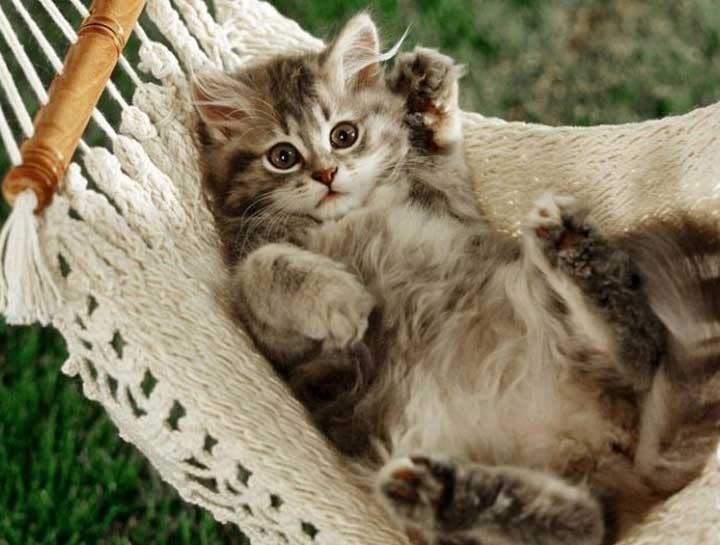
Being home more means having more time to observe our pets’ occasional weird behavior. Just why do they do the things they do? For some of these quirks, scientists still don’t have all the answers. But sometimes, just knowing we’re not alone may be all the answer we need. So here’s our list of oddities for both dogs and cats:
Zoomies
Getting a bath can elicit an exuberant burst of energy that many dog owners call, “the zoomies.” But sometimes, an attack of the zoomies can come at anytime, wet or dry. And while it may occur most often in puppies and young dogs, this behavior is known to affect dogs of any age or breed.
This uncontainable burst of energy is, thankfully, short-lived. Unless your dog has any medical conditions for which their level of exertion should be limited—such as healing from stitches or injury, or a heart condition—zoomies are more likely to be harmful to your home than to your dog.
For that reason, it’s best to keep any objects that could be knocked over, or off of a table, in a safer location. If you find that you need to make your home a zoomie-free zone, a long walk can do wonders to release pent-up energy in a more controlled manner.
Kicking their legs after going potty
Does your dog kick their back legs after pooping or peeing? If they are trying to bury the evidence, they’re doing a pretty poor job of it! In reality, they are adding their calling card to their deposit. We may not be the wiser, but the pheromones from dogs’ feet last longer than the rather pungent (to us) scent of feces or urine.
Waste odors lose their potency rather quickly, especially if we are being responsible pet owners and picking up after our dog. But when a dog kicks their back legs, they are spreading those pheromones on the ground and leaving no doubt that the territory has been claimed. Until the next dog comes along and plants its own flag.
Here’s a fun fact while we’re on the subject of poo: Did you know dogs prefer to relieve themselves along a north-south axis? This could explain why they spin before they go. Researchers watched almost 7,500 acts of, um…relieve-ation over 2 years and found that they actively avoid going on an east-west alignment. Why they do this is anybody’s guess.
Scooting
There are many reasons why your dog may “moonwalk,” but the main cause is that they are trying to soothe irritation. While it’s certainly not soothing your irritation, finding out the cause can relieve you both. The reason could be as simple as having “remnants” stuck to their fur after defecating, razor burn from the groomer, or something that requires a vet’s attention.
Anal sacs, the two glands on either side of a dog’s anus that normally empty when they poop, may become clogged and painfully inflamed. This can even lead to infection. Scooting may help to release these sacs; but if it continues, a trip to the vet to have your pet’s anal glands expressed is needed.
Intestinal parasites could also cause itching and irritation in the area. You don’t have to see parasites for them to be there; sometimes examining your dog’s stool under a microscope is the only way to get to the bottom of the problem. You can leave that to us.
In short, if your dog only scoots occasionally, it’s usually nothing to worry about. But if they scoot often, a visit to the vet is required to leave this issue behind. (We’re done with the puns now, we promise!)
Nesting
Burrowing into blankets, scratching at covers, or rearranging bedding are all ways your dog “nests” before going to sleep. While this behavior may go back to their ancestors, to make sure their den was free of insects and make things generally more comfortable, today’s dogs are likely just looking to be cozier.
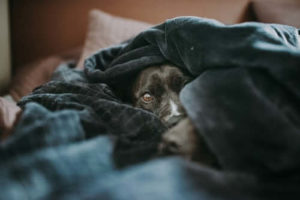
Nesting dogs may also be trying to spread their aforementioned paw pheromones on the bedding, especially if their bed or your sheets have been freshly laundered. Nesting can also be a symptom of compulsive behavior, or it can be stress-based. Dogs may even do this when they’re in pain; so if it becomes excessive, talk to your vet.
Hiding food
Have you ever picked up your dog’s bed and had kibble fall out? Or have you ever moved the couch to find a stash of treats under it? We may have even seen them nosing up invisible “dirt” in an attempt to “air” bury their treasure.
Hiding food is common in wild dogs, and our dog may simply be driven by instinct. Their stomachs may be too full to enjoy that treat you just gave them, and they want to save it for later. Or, they may feel that a treat, chew, or toy is especially… well…special, and they want to safely stash it for later. After all, dogs. often hide their most prized possessions.
This habit is mostly harmless, unless your dog is hiding perishable food that can attract pests, or they are trying to eat food that has spoiled. If your dog is suffering from nausea or another ailment that causes them to lose its appetite, it may attempt to hide its food. If your dog isn’t eating or is suffering from vomiting, diarrhea, or other changes to its usual routine, it may be time to visit the vet.
Popcorn paws
Some people describe their dog’s paws as smelling like popcorn or Fritos, or some other maize-based product. While there are worse things than smelling Frito feet, it’s the microbes on your dog’s paws that smell like corn.
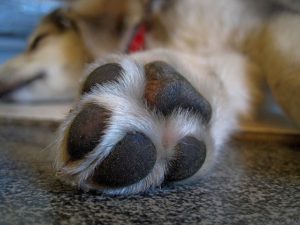
The moist crevices of your dog’s paw pads are the ideal environment to host yeast and bacteria. It’s the Proteus bacteria in particular that smell like tortillas. If the smell is overwhelmingly strong though, or if your dog is excessively licking their paws, it could be a sign of infection and it may be time for a checkup.
Eating Grass
This is another one of those behaviors that baffle the experts. Some believe that a dog eats grass because they aren’t feeling good and feel the need to throw up, while others believe that grass consumption is the cause of vomiting—a sort of chicken or egg conundrum.
Some dogs, though, eat grass and never throw up. It could be that they simply like the taste of grass or they’re just bored. Whether your dog is a grass eater or not, be sure to keep them from ingesting any grass that has been treated with pesticides, herbicides, or fertilizers.
Cats may be famously considered the more mysterious half of our cat and dog duo under consideration, but they have less explained odd behaviors. Let’s hope they don’t gloat too much!
“If it fits, I sits”
We know the drill: The cat will happily ignore their new toy in favor of the box it came in. There are a few reasons why cats love to be in enclosed spaces. One is that it makes them feel safe. They may feel like it’s harder to sneak up on them when they are within four walls.

At the same time, those walls also help trap warmth, especially if it’s a box with insulating properties. In addition to being cozy, boxes provide a place from which to observe the world, where they can pop out, cat-in-the-box style, on anyone or anything that ventures by.
Knocking things over “on purpose”
This one has behavioral experts stumped, but they have several theories. Cats are curious about objects; and some say that this, combined with their hunting instinct, causes them to want to pat and move things around.
When they’re hunting, knocking things around helps them to decipher what is good to eat and what is better left alone. Plus, it’s great fun to watch your reaction! For some cats, any attention—good or bad—is still good, especially if they’re bored.
Hiding
If your cat loves to hide, don’t worry. It’s not usually because they don’t like you! Seriously though, hiding simply provides a sense of security. Just like the box effect, cats feel extra safe when they feel like nothing can take them by surprise. If you miss your cat’s company, try providing places they can hide within the same room as you.
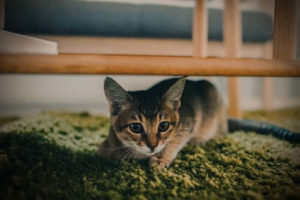
Sleeping on our faces
The good news is they’re not trying to smother us in our sleep! A couple of possible reasons are rather sweet. They may feel safer and more secure sleeping by our heads. Our heads are also warm, and probably the most motionless part of our body when we sleep; meaning, they get to doze uninterrupted.
Biting when being petted
If you have ever been petting your seemingly content cat, only to have accidentally activated the “bite switch” somehow, then you know how confusing this behavior is. Your cat was probably confused too…about how you didn’t know they were finished being petted! They could just get up and leave, but they’re happy where they’re at, and they just want you to stop.
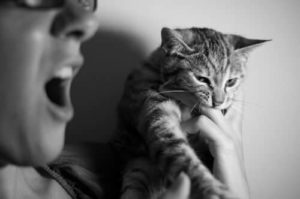
Sometimes, the level of irritation is already so high that they bite and run. Or maybe they run because you started screaming. Cats are hypersensitive, and petting can lead to overstimulation.
Has your loved one ever held your hand and mindlessly rubbed their thumb over your skin? What is sweet and innocuous at first may quickly become a source of irritation; we may not even realize it until we just need it to stop! Usually, a cat will give warning signs, so be sure to be attuned to their cues. And always let them be free to walk away when they’ve had enough.
How many of these weird things does your pet do? Did we miss anything? You can always ask us about your pet’s strange behaviors; we may not always have the answer, but we can assure you: You’re in good company!
